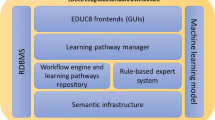Abstract
By learning a more distributed representation of the input space, clustering can be a powerful source of information for boosting the performance of predictive models. While such semi-supervised methods based on clustering have been applied to increase the accuracy of predictions of external tests, they have not yet been applied to improve within-tutor prediction of student responses. We use a widely adopted model for student prediction called knowledge tracing as our predictor and demonstrate how clustering students can improve model accuracy. The intuition behind this application of clustering is that different groups of students can be better fit with separate models. High performing students, for example, might be better modeled with a higher knowledge tracing learning rate parameter than lower performing students. We use a bagging method that exploits clusterings at different values for K in order to capture a variety of different categorizations of students. The method then combines the predictions of each cluster in order to produce a more accurate result than without clustering.
A longer version of this paper is available online at: http://web.cs.wpi.edu/~gsarkozy/Cikkek/57.pdf
Access this chapter
Tax calculation will be finalised at checkout
Purchases are for personal use only
Preview
Unable to display preview. Download preview PDF.
Similar content being viewed by others
References
Ritter, S., Harris, T., Nixon, T., Dickison, D., Murray, R., Towle, B.: Reducing the knowledge tracing space. In: In Proceedings of the International Conference on Educational Data Mining, Cordoba, Spain, pp. 151–160 (2009)
Corbett, A.T., Anderson, J.R.: Knowledge Tracing: Modeling the Acquisition of Procedural Knowledge. User Modeling and User Adapted Interaction 4, 253–278 (1995)
Trivedi, S., Pardos, Z.A., Heffernan, N.T.: Clustering Students to Generate an Ensemble to Improve Standard Test Score Predictions. In: Biswas, G., Bull, S., Kay, J., Mitrovic, A. (eds.) AIED 2011. LNCS, vol. 6738, pp. 377–384. Springer, Heidelberg (2011)
Luxburg, U.: A Tutorial on Spectral Clustering. In: Statistics and Computing, vol. 17(4). Kluwer Academic Publishers, Hingham (2007)
Koedinger, K.R., Corbett, A.T.: Cognitive tutors: Technology bringing learning science to the classroom. In: Sawyer, K. (ed.) The Cambridge Handbook of the Learning Sciences, pp. 61–78. Cambridge University Press, New York (2006)
Pardos, Z.A., Heffernan, N.T.: Using HMMs and bagged decision trees to leverage rich features of user and skill from an intelligent tutoring system dataset. To appear in Journal of Machine Learning Research W & CP
Author information
Authors and Affiliations
Editor information
Editors and Affiliations
Rights and permissions
Copyright information
© 2012 Springer-Verlag Berlin Heidelberg
About this paper
Cite this paper
Pardos, Z.A., Trivedi, S., Heffernan, N.T., Sárközy, G.N. (2012). Clustered Knowledge Tracing. In: Cerri, S.A., Clancey, W.J., Papadourakis, G., Panourgia, K. (eds) Intelligent Tutoring Systems. ITS 2012. Lecture Notes in Computer Science, vol 7315. Springer, Berlin, Heidelberg. https://doi.org/10.1007/978-3-642-30950-2_52
Download citation
DOI: https://doi.org/10.1007/978-3-642-30950-2_52
Publisher Name: Springer, Berlin, Heidelberg
Print ISBN: 978-3-642-30949-6
Online ISBN: 978-3-642-30950-2
eBook Packages: Computer ScienceComputer Science (R0)




